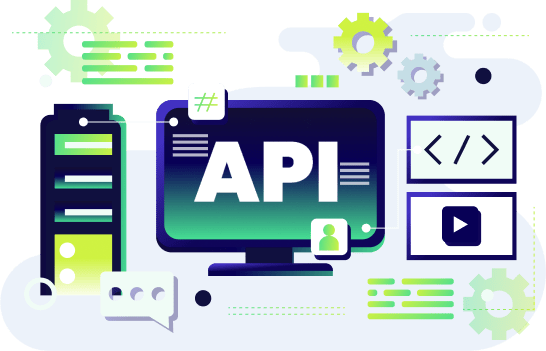Unlocking Innovation with Qyrus’ API Discovery: The AI Chrome Extension

API adoption and integration have continuously increased in the IT industry to support growing business demands. Today, hundreds of APIs (application programming interfaces) support various dynamic product categories, from payments and social media to e-commerce.
According to a McKinsey survey, nearly 80% of people believe APIs are crucial for business and IT operations. This highlights how API and web services testing strategies have become in driving innovation and efficiency across various sectors.
APIs are everywhere, as developers create them as a connecting link between shortcodes to build secure and scalable software applications. However, for each use case, the API must follow specific standards to ensure seamless communication, so teams follow a well-defined API lifecycle to create, test, and deploy APIs. Web services and API testing is a critical component of the API lifecycle, ensuring that these digital connections function as intended. Let us look at what happens during API discovery and testing.
API Discovery with Qyrus
While testing APIs has become more streamlined, uncovering the complexities of APIs powering a web application and their interactions remains a time-consuming and manual task.
This is where Qyrus offers a more efficient approach. Introducing the API Discovery extension, your one-stop shop for effortlessly discovering APIs within your Chrome browser. This ingenious tool seamlessly integrates with your developer tools, transforming into your personal AI assistant on the API exploration journey.
Qyrus’ API Discovery empowers you to visit your web application and record all relevant API calls for your business needs. It revolutionizes API and web services testing by automating the discovery of critical API calls. No more digging through irrelevant analytics or user monitoring calls. Our AI capabilities elevate the experience further by providing explanations for each API call, a game-changer for QA engineers who often spend precious time deciphering cryptic documentation.
API Discovery goes beyond mere recording. It goes deeper by mapping the API landscape and uncovering the hidden relationships between APIs. Think of it as a cartographer meticulously charting an unknown territory. It reveals how APIs interact, for instance, how a user access token might be used across all APIs following a user authentication call. This visualization of the API process provides invaluable insight into the application’s overall functionality.
Seamless Integration for Effortless Testing
The API Discovery lies in its seamless integration with the Qyrus API Testing service. All recorded API calls and their dependencies can be exported directly as cloud-based API tests, ensuring they’re readily available for future use. This eliminates the tedious task of manual test creation, saving you valuable time and resources.
Consider an application where a tester diligently tests your application flow. In the background, API Discovery silently records all the relevant APIs. Once finished, with a few clicks, you can export these recorded APIs as automated tests within the Qyrus platform. It’s like testing on autopilot, maximizing efficiency and minimizing effort.
Maximizing Efficiency
API Discovery’s functionality extends further. It works seamlessly alongside the Qyrus Encapsulate extension, allowing you to record regression tests while simultaneously capturing relevant APIs.
We understand the importance of thorough testing. That’s why API Discovery goes beyond recording. It empowers you to generate assertions – the cornerstones of robust API testing. Assertions allow you to “battle-test” your APIs, ensuring the responses meet pre-defined values or checks for specific elements within the response.
Creating assertions can be a time-consuming task. Here’s where our innovative Generative AI steps in. This cutting-edge technology helps you generate assertions automatically, freeing you from tedious manual work and allowing you to focus on more strategic aspects of testing.
Role of API testing
Once the APIs are discoverable, the process of validating the use case logic and its capability to provide reliability and test other aspects of the application is equally important. API Testing’s primary purpose is to help teams catch issues before they reach production and impact users. There are multiple ways on how a developer chooses to test an API-
- Functional Testing: Validates that the API can perform its defined functions accurately and reliably.
- Unit Testing: Focuses on individual components of an API, ensuring each function works as intended.
- Integration Testing: Ensures that different systems or components work together correctly and seamlessly.
- Performance Testing: Used to evaluate how quickly and efficiently an API can respond to requests to ensure optimal performance.
- Load Testing: Assesses how the API behaves under heavy load to ensure it can handle high traffic volumes.
- Stress Testing: Pushes the API beyond average capacity to see how it manages extreme conditions and high stress.
- Security Testing: Testing an API to ensure it correctly handles encrypted communication and user authentication.
- Fuzz Testing: Provides unexpected inputs to uncover bugs and vulnerabilities, ensuring robust error management.
Integrating Qyrus’ API Discovery into Web Testing Practices
Qyrus provides comprehensively advanced API testing solutions. Our platform supports various testing types—from functional to performance and end-to-end tests. Users can seamlessly import Postman collections or OpenAPI specs, simplifying test setup and management. The platform’s intuitive interface allows for the easy creation of complex API workflows, ensuring comprehensive test coverage.
Moreover, Qyrus offers a groundbreaking feature, the Qyrus API Discovery plugin. This Chrome extension integrates directly into your web testing environment, providing contextual API testing capabilities. By aligning API testing with functional testing workflows, API Discovery enhances efficiency and reduces workflow disruptions. It empowers developers and functional testers to actively participate in API testing, leveraging your contextual knowledge to drive better testing outcomes.
Here’s a detailed look at how the API Discovery tool transforms the API testing landscape.
Domain-Specific Control
Qyrus allows testers to specify which domains to include or exclude, providing complete control over the scope of testing. For instance, if your functionality depends on external sites not running on the same domain, you can easily add those to the testing environment. This ensures that only relevant data and interactions are considered, streamlining the testing process and reducing unnecessary noise.
Automated Test Generation
Once the domains are set, Qyrus can quickly generate tests by analyzing the API calls made during functional testing. For example, when authenticating, Qyrus captures the headers, payload, and response, allowing you to generate assertions and dependencies automatically. This functionality is particularly useful for complex API interactions, as Qyrus can map out dependencies between multiple API calls, providing a clear understanding of the data flow and interactions.
Comprehensive Assertions
Assertions in Qyrus are cordless and can be generated directly from the captured data. Schema validation and JSON path assertions are built-in, ensuring the response conforms to expected formats and values. This level of detail is often time-consuming to implement manually, but with Qyrus, it becomes a quick and automated process. For example, if you are testing a financial application, you can easily assert that account summaries return the correct balance for each account.
Seamless Integration with Qyrus
Qyrus seamlessly integrates with your API interface, allowing you to export and execute tests within minutes. By logging into Qyrus, you can select the relevant project and test suites, and the tool will automatically populate the necessary data and assertions. This integration ensures that the testing process is both fast and efficient, significantly reducing the time from test creation to execution.
Handling Failures and Customization
Qyrus API tool provides detailed reports and allows you to quickly identify and resolve failures. For instance, if a date assertion fails due to a time mismatch, you can easily modify or remove the assertion and re-run the test. This flexibility ensures that you can fine-tune your tests to match the dynamic nature of your applications.
Benefits of Using Qyrus
- Fast Setup: Even with no prior knowledge of the APIs, you can start testing immediately by capturing calls during functional testing.
- High Coverage: API testing inherently provides high coverage; with Qyrus, you achieve this with minimal setup.
- Reduced Manual Effort: Automated assertions and test generation minimize the need for manual coding and reduce potential errors.
- Seamless Integration: The Qyrus API tool directly integrates for centralized reporting and orchestration, extending its benefits to performance testing and beyond.
How It Works: From Recording to Testing
Imagine you’re performing functional testing on a web application. With our Chrome extension enabled, every API call made during your testing session is automatically recorded and presented in a human-readable format. This critical contextualization bridges the gap between functional testing activities and the need to validate APIs that power these applications.
Once the API calls are captured, testers can filter out irrelevant calls or domains, focusing solely on the APIs that impact the application’s functionality. This selective approach ensures that the generated API tests are precise and targeted, saving time and effort in creating comprehensive test scenarios.
Empowering Testers with AI-Driven Automation
At the heart of our solution lies our AI-driven testing platform. Integrated seamlessly with the Chrome extension, Qyrus analyzes the captured API interactions and automatically generates test scenarios and assertions. This automation feature not only accelerates the API testing lifecycle but also enhances test coverage by including schema validations, JSON path assertions, and header validations.
Also, Qyrus provides advanced features such as dependency analysis between APIs. This capability
allows testers to visualize and understand the relationships and dependencies among different API calls, optimizing test coverage and ensuring thorough validation of critical paths.
Seamless Integration and Execution with Qyrus
Once the tests and assertions are generated, testers can export them directly into the Qyrus application. This integration further helps in the centralized management of API tests within Qyrus, where testers can organize tests into projects and test suites for structured execution and reporting. Qyrus provides detailed test reports that highlight both successful validations and any failures encountered, empowering testers to identify and resolve issues seamlessly.
“Looking ahead, we are expanding these capabilities to include mobile applications. This extension will enable testers to achieve similar levels of integration and automation across different platforms, ensuring consistent and reliable API testing practices regardless of the application’s environment“- Ameet Deshpande AVP, Product Engineering @Qyrus.
To gain a deeper understanding of the capabilities of Qyrus API tools, watch this webinar, in which Ameet provides a comprehensive walk-through of the application and its features.
API Management tools can help you streamline the entire API lifecycle. It is important to choose the right tool based on your needs. Choose Qyrus, a flexible API management platform that lets you incorporate the tools of your choice but manage them centrally. By building a systematic API discovery practice, organizations can foster innovation and streamline development processes.





